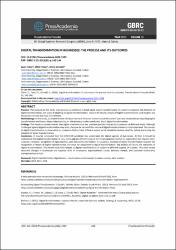| dc.contributor.author | Teker, Suat | en_US |
| dc.contributor.author | Teker, Dilek | en_US |
| dc.contributor.author | Örendil, Emre | en_US |
| dc.date.accessioned | 2023-02-23T12:56:46Z | |
| dc.date.available | 2023-02-23T12:56:46Z | |
| dc.date.issued | 2022-07-30 | |
| dc.identifier.citation | Teker, S., Teker, D. & Örendil, E. (2022). Digital transformation in businesses: the process and its outcomes. PressAcademia Procedia, 15(1), 142-144. doi:10.17261/Pressacademia.2022.1599 | en_US |
| dc.identifier.issn | 2459-0762 | en_US |
| dc.identifier.uri | https://hdl.handle.net/11729/5392 | |
| dc.identifier.uri | http://dx.doi.org/10.17261/Pressacademia.2022.1599 | |
| dc.description.abstract | Purpose- The purpose of this study is to serve as an extensive outlook about digital transformation. Its content comprises the elements of digital transformation, the ways of adapting to digital transformation, reasons for failure, means of digital transformation, and insights and discussions on new business environment. Methodology- In this study, a comprehensive literature review is followed to learn about the current business circumstances regarding digital transformation and have a deep understanding on the previous studies conducted about digital transformation. Findings- The literature review reveals that digital transformation has provided positive impract on businesses at different levels. Although challenges against digital transformation may arise, they can be tackled if the nature of digital transformation is understood well. The success of digital transformation is dependent on numerous factors from different aspect which should be studied carefully before and during the adoption of digital transformation. Conclusion- It may be concluded that the COVID-19 pandemic has accelerated the digital agenda of businesses. At first, it should be understood that digital transformation is not a mere upgrade of technology or technical equipment within an organization but requires time, curiosity, creativity, recognition of opportunities, and cultural transformation. A successful adoption of digital transformation requires the recognition of means of digital transformation, the steps for adaptation to digital transformation, the analysis of failure, the outcomes of digital transformation. The recent evolutions related to digital transformation is evident in different aspects of business. The most recent observed changes in businesses are required skills of employees, organisational culture, business models, and customer relationship management practices. | en_US |
| dc.language.iso | en | en_US |
| dc.publisher | PressAcademia | en_US |
| dc.relation.ispartof | PressAcademia Procedia | en_US |
| dc.rights | info:eu-repo/semantics/openAccess | en_US |
| dc.subject | Digital transformation | en_US |
| dc.subject | Digitalization | en_US |
| dc.subject | New business environment | en_US |
| dc.subject | Business success | en_US |
| dc.subject | Data analysis | en_US |
| dc.title | Digital transformation in businesses: the process and its outcomes | en_US |
| dc.type | Article | en_US |
| dc.description.version | Publisher's Version | en_US |
| dc.department | Işık Üniversitesi, İktisadi ve İdari Bilimler Fakültesi, İşletme Bölümü | |
| dc.department | Işık University, Faculty of Economics and Administrative Sciences, Department of Management | en_US |
| dc.authorid | 0000-0002-3893-4015 | |
| dc.authorid | 0000-0002-1924-8255 | |
| dc.authorid | 0000-0002-3893-4015 | en_US |
| dc.authorid | 0000-0002-1924-8255 | en_US |
| dc.authorid | 0000-0002-7981-3121 | en_US |
| dc.identifier.volume | 15 | |
| dc.identifier.issue | 1 | |
| dc.identifier.startpage | 142 | |
| dc.identifier.endpage | 144 | |
| dc.peerreviewed | Yes | en_US |
| dc.publicationstatus | Published | en_US |
| dc.relation.publicationcategory | Makale - Ulusal Hakemli Dergi - Kurum Öğretim Elemanı | en_US |
| dc.institutionauthor | Teker, Suat | en_US |
| dc.institutionauthor | Teker, Dilek | en_US |
| dc.institutionauthor | Örendil, Emre | en_US |


















